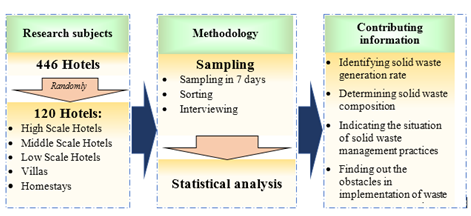Document Type : ORIGINAL RESEARCH ARTICLE
Authors
1 Okayama University, Graduate school of Environmental and Life Science, Department of Environmental Science, 3-1-1 Tsushima, Kita, Okayama, Japan
2 National University of Civil Engineering, Department of Environmental Technology and Management, 55 Giai Phong Road, Hai Ba Trung, Ha Noi, Vietnam
Abstract
The current study aims to analyze waste characteristics and management practices of the hotel industry in Hoi An, a tourism city in the center of Vietnam. Solid wastes from 120 hotels were sampled, the face-to-face interviews were conducted, and statistical methods were carried out to analyze the data. The results showed that the mean of waste generation rate of the hotels was 2.28 kg/guest/day and strongly correlated to internal influencing factors such as the capacity, the price of the room, garden, and level of restaurant. The differences in waste generation rate of the hotels were proved to be statistically significant. The higher the scale of hotels, the higher the waste generation rate. Moreover, the waste composition of the hotels was identified by 58.5% for biodegradable waste, 25.8% for recyclables and 15.7% for others. The relative differences in the waste composition of the hotels by climate, the features of hotels, and the types of the guest were explained. Whereby, the higher size of the hotels, the higher percentage of biodegradable and less proportion of recyclable waste. Also, this study revealed that the implementation status of waste management practices of the hoteliers initially reaped quite positive achievements with 76% for sorting, 39% for recycling, 29% for reduction, and 0.8% for composting. The rate of waste management practices was proportional to the scale of the hotel. This study provided information on waste management practice of hotel industry and contributed to the overall assessment of municipal solid waste management practices of Hoi An city.
Graphical Abstract
Highlights
- Hotel waste generation rate is significantly different between types of hotels
- Garden, restaurant, capacity, and the price of the room influent to hotel waste generation
- 84.3% of hotel waste are recyclable
- The higher scale of the hotel, the more attention in solid waste management practices
Keywords
- Hotel Industry
- Solid waste composition
- Solid waste generation
- Solid waste management
- Solid waste practice
- Vietnam
Main Subjects



Letters to Editor
[1] Letters that include statements of statistics, facts, research, or theories should include appropriate references, although more than three are discouraged.
[2] Letters that are personal attacks on an author rather than thoughtful criticism of the author’s ideas will not be considered for publication.
[3] Letters can be no more than 300 words in length.
[4] Letter writers should include a statement at the beginning of the letter stating that it is being submitted either for publication or not.
[5] Anonymous letters will not be considered.
[6] Letter writers must include their city and state of residence or work.
[7] Letters will be edited for clarity and length.
Send comment about this article